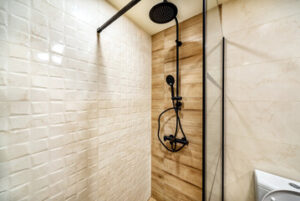Gutter Cleaning Cincinnati prevents water overflow that can damage the roof and walls of a house. It also discourages pests that seek shelter in clogged gutters.

Gutter cleaning is a necessary maintenance task that should be completed twice a year. It’s important to know how much a professional charges before hiring one.
Gutters move water away from the building, helping to prevent dampness issues, rot, and landscaping damage. However, they can become clogged with leaves and other debris, leading to overflow and leaks. Keeping gutters clean is therefore essential for the security and integrity of your home or business. If you’re unsure of how to tackle this chore, consider calling in a local gutter cleaning professional. This will save you the trouble of climbing a ladder or buying expensive equipment, and will also ensure your gutters are cleaned properly.
To do the job safely, choose a tall ladder that extends at least three feet over the gutter and secure it on even ground. Always wear work gloves and a pair of protective eyewear. It’s also a good idea to have a helper at the base of the ladder to steady it in case you lose your balance. A telescopic brush is another useful tool for cleaning your gutters, allowing you to reach difficult-to-reach places. Some gutter cleaners are specially designed to be used with these brushes, making the process much easier and faster.
For heavy-duty clogged gutters, you can try using a pressure washer to blast away caked dirt and sludge. However, this method isn’t recommended for unpainted aluminum or vinyl gutters because it can cause damage. It’s also messy and can be dangerous if the nozzle is pointed directly at the roof or siding.
Another alternative is to vacuum your gutters using a power hose attachment. However, this isn’t as effective as using a pressure washer and can be just as messy with water and debris splattering. Start in the corners of each gutter section and work your way to the middle, ensuring all leaves, twigs, and gunk are suctioned up. Once you’ve finished, run water through each downspout to verify it’s fully cleared. Then, inspect each gutter section and reinstall any that have come loose or fallen off. If your gutters are leaking or rotting, call a local gutter repair contractor to resolve the problem. The sooner you deal with a gutter issue, the less likely it will become serious.
Equipment
There are a few different gutter cleaning tools that can help you get the job done. Some are handheld, while others attach to a telescopic pole and allow you to stay safely on the ground, reducing ladder-related accidents. It is important to choose a tool that fits your needs and the size of your gutters. Some are also able to attach to a hose, which can be helpful for rinsing your gutters after they’re clean.
Many homeowners choose to use a gutter cleaning tool that looks like a large candy scoop. These tools affix to the end of a telescoping pole and can reach down into your gutters to loosen leaves and other debris. They are an excellent option for DIYers who are comfortable using a ladder.
Another popular option is a gutter-cleaning nozzle, which attaches to the end of a garden hose or power washer. These nozzles can be directed along the length of your gutters to dislodge and wash away leaves, twigs, pine needles, dirt, and other debris. You can also direct the nozzle into your downspouts to clear blockages.
These tools are best used for moderately clogged gutters and can be a great alternative to climbing on a ladder. You should always wear gloves when handling these types of tools, as they can be quite dirty and may contain sharp objects. It is also a good idea to have a garbage bag nearby for collecting debris, as it can be messy.
A telescoping claw is a more aggressive gutter-cleaning tool that can help you break up tough blockages in your gutters. These devices are designed to affix to the end of a ladder and can reach down into your gutters to break up dirt and other debris. They are an excellent option if you have trouble climbing on a ladder, but they can be difficult to use on narrow sections of your gutters.
It’s still essential to hire a professional gutter cleaner for a thorough clean. A professional can use a pressure washer to reach even the most difficult-to-reach areas, and they will have the experience and skills needed to identify and address any potential problems with your gutters, such as sagging or leaks.
Safety Tips
Gutter cleaning isn’t an easy job, but it’s a vital one. Clogged gutters can lead to basement flooding and the growth of mold spores that can trigger allergic reactions and respiratory conditions. Gutter cleaning also prevents water from overflowing and damaging the siding, foundation and other parts of the home.
Most injuries that occur during gutter cleaning are ladder-related, so safety is paramount. It’s essential to choose a ladder that is tall enough for the job and to use it carefully. Don’t stand at the top or reach too far from the ladder, and always have a spotter to hold the base of the ladder for stability.
Another important safety tip is to wear gloves and eye protection when handling debris from a clogged gutter. Rotting leaf debris often contains bacteria, so gloves can help keep hands clean and free of contaminants. Eye protection is important because clogged gutters can become a breeding ground for insects and rodents, and these pests can be flying around at high speeds when you start removing the debris from the gutters.
Once you’ve removed all of the visible debris, use a hose to wash down the gutters and dislodge any remaining debris. Then, inspect the downspouts to make sure they aren’t clogged or blocked and that water is flowing freely from them. If the gutters are clogged or damaged, contact a professional to schedule repairs.
It’s essential to hire a professional gutter cleaning service if you don’t feel comfortable climbing a ladder. Especially in the winter when ice and snow can make ladder climbing more dangerous. A professional can handle the tricky job of gutter cleaning even in these conditions and can ensure the job is done correctly so your gutter system continues to function properly. Also, a professional can provide you with a comprehensive gutter maintenance plan that includes regular cleanings to prevent future problems. Gutter maintenance plans can also save you money by reducing the frequency of gutter cleaning services and can reduce the cost of repairs down the road. Lastly, hiring a professional can reduce the risk of injury so you can focus on the task at hand: getting your gutters cleaned.
Cleaning Your Gutters
Gutter cleaning is a dirty and tedious process, but it’s a necessary one that should be done once or twice per year to prevent water damage to your home. Clogged gutters allow rainwater to overflow, and the water can cause damage to your roof, walls, fascia board, shingles, foundation, siding, and even your landscaping.
If you notice wet spots on the wall or brown water stains along your house’s exterior, this is a sign that your gutters are overflowing and need to be cleaned. Water leaking from the overflowing gutters can cause moisture and mold in your home, and the water can also flow behind your siding and into your foundation, leading to expensive repairs.
Gutters are designed to funnel water off the roof and away from the building’s foundation, but if they become clogged with leaves, sticks, debris, and other materials, they can overflow and flood your building’s foundation. This can lead to structural damage and reduce the value of your property.
Using a ladder to clean your gutters can be dangerous, so it’s important to use safety precautions. Make sure the ladder is stable and not leaning in any direction before you climb it. Use a ladder stabilizer to keep it in place while you work, and wear thick gloves to protect your hands from dirt, debris, animal excrement, and other contaminants.
If you choose to hire a professional gutter cleaner, it’s important to find a company with good customer service. This includes a quick response time, an on-site estimate, and efficient cleaning services. Look for a company that uses high-powered blowers to clear blockages, ensuring a seamless exit for rainwater. The ground crew should then remove the expelled material and properly dispose of it.
Gutters are an integral part of any building, but they can overflow and become clogged with debris if they aren’t cleaned regularly. The result is that water cannot flow freely off the roof and into downspouts, which can lead to water damage in your home. A clogged gutter can also trap snow and ice, which creates additional weight on your roof and can break your shingles.

